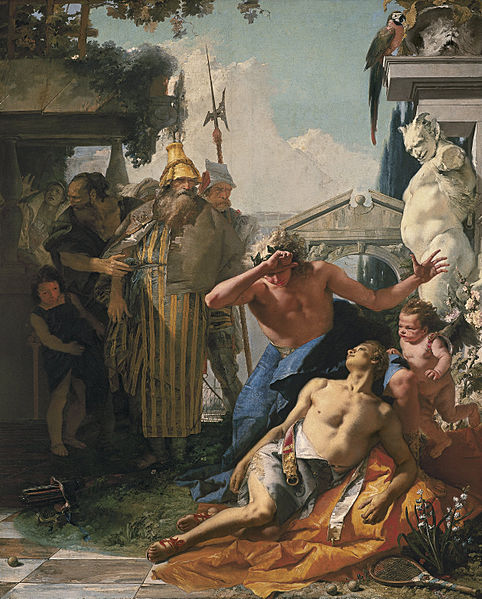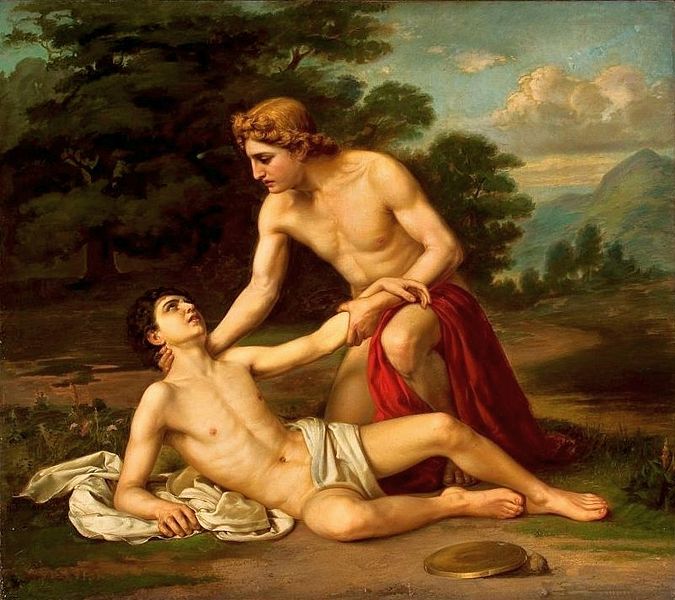HYACINTH IN GREEK MYTHOLOGY
Hyacinth, according to tales of Greek mythology, was said to have been amongst the most beautiful of mortals, loved by mortals and gods; but on the earth for but a short while, the death of Hyacinth was said to have given rise to a flower bearing the mortal’s name.
Hyacinth the Spartan
|
Hyacinth, or Hyacinthus as he is also often called, is most widely associated with Sparta, for some name Hyacinth as the grandson of Lacedaemon.
Earlier tales though place Hyacinth in Magnesia, where King Magnes was named father of Hyacinth, or in Pieria, when King Pieros is named such. In the latter case, Hyacinth’s mother is named as the Muse Clio who Aphrodite cursed to fall in love with the mortal Pieros. Nevertheless, when Hyacinth is named a Prince of Sparta, he is regarded as a son of King Amyclas and Diomede; Amyclas being a son of Lacedaemon and Diomede, a daughter of Lapithus. |
The parentage of Amyclas and Diomede, would make Hyacinth sibling to the likes of Argalus, Cynortes, Daphne, Harpalus, Laodamia, Leanira and Polyboea. Though, as Daphne is normally named a Naiad nymph, there are disagreements about the children of Amyclas and Diomede.
Hyacinth and Thamyris
|
Hyacinth is regarded as amongst the most beautiful of mortal youths, with beauty comparable to Endymion and Ganymede.
It was said that it was another mortal man, Thamyris, son of Philammon, who first fell in love with Hyacinth, but their time together was said to be short lived, for Thamyris rashly challenged the Muses to a musical contest; a contest which Thamyris of course lost and was appropriately punished. |
|
Hyacinth and Apollo
Hyacinth though has a more famous lover in the form of the Greek god Apollo; and some say that it was Apollo who forced the contest against the Muses upon Thamyris to rid himself of a love rival.
|
For a while Hyacinth and Apollo were inseparable, and Hyacinth would accompany Apollo around the world upon a chariot pulled by swans.
Apollo would thus teach Hyacinth how to play the lyre, how to use the bow, and how to hunt. One day Apollo was teaching Hyacinth how to throw the discus, and in a demonstration the god threw the discus which such ferocity that it split the clouds in two. Eventually, the discus returned to earth, and Hyacinth went to retrieve it, but as the discus hit the earth, so it rebounded, hitting Hyacinth upon the head, killing him. Now, Apollo was the god of healing, but even his skill was not enough to revive Hyacinth; and subsequently it was said that the burial mound of Hyacinth could be found at Amyclae; and an annual festival, the Hyacinthia would take place there. The Hyacinth flower was said to have grown from the spots of blood that fell from Hyacinth’s head wound. |
|
Hyacinth and the Jealousy of Zephyrus
There is a famous embellishment to the story of the death of Hyacinth, for it was said that the Spartan prince was loved by more than one of the immortals; and it was said that Zephyrus, the god of the West wind, was greatly enamoured by the youth. When Hyacinth chose Apollo over Zephyrus though, the wind god was said to have had his revenge, and when Apollo threw the discus was said to have blown the discus to cause the head wound upon Hyacinth.
In a few versions of the Hyacinth myth, it was said that Apollo was eventually able to resurrect Hyacinth, making the Spartan prince immortal, and then the goddesses, Aphrodite, Athena and Artemis were said to have transported Hyacinth to Mount Olympus.
In a few versions of the Hyacinth myth, it was said that Apollo was eventually able to resurrect Hyacinth, making the Spartan prince immortal, and then the goddesses, Aphrodite, Athena and Artemis were said to have transported Hyacinth to Mount Olympus.
|
|
Colin Quartermain - Hyacinth - 20th October 2019

